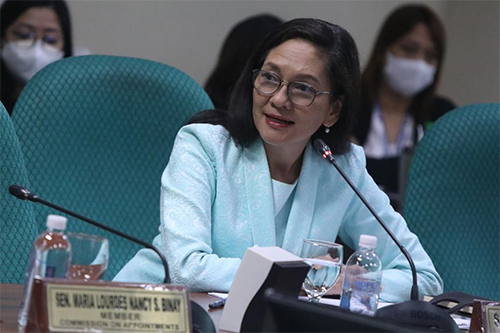
By Dean Aubrey Caratiquet
On Friday, Senator Risa Hontiveros proposed Senate Resolution No. 1234 seeking an official investigation on the recent wave of unauthorized transactions, scams, and other irregularities involving mobile financial services.
Hontiveros said that the Senate must review existing rules and regulations governing the financial technology or ‘fintech’ sector, since there is “no legislative framework yet in place to ensure stability and transparency, build public trust, and promote inclusion vis-à-vis this class of services.”
“Mobile financial services have become a part of daily life for millions of Filipinos, and the fintech sector has been an important driver of economic growth and financial inclusion. GCash alone has an estimated 76 million users who posted P6 trillion worth of transactions in 2022—that is almost equal to our national budget next year,” Hontiveros said.
She said that mobile financial services have been of great importance to Filipinos, especially those who are “unbanked” or lack the capacity to open a bank account, thus highlighting the necessity of legislation that can protect Filipino digital wallet users from scams, hacking incidents, and other irregularities in using such digital services.
The senator’s resolution particularly cited the recent wave of unauthorized transactions in GCash, a leading mobile financial service provider, in which money from GCash user accounts was transferred to unknown phone numbers; similar instances of such irregularities that occurred in 2023 in which multiple GCash accounts were compromised using ‘phishing attacks’ staged through various online gambling platforms are also noted in proposed SR 1234.
GCash operator G-Xchange Inc. has attributed the transfers to errors in an “on-going system reconciliation process” and the Department of Information and Communications Technology (DICT) has stated that the incident is “an internal issue” rather than external hacking.
The senator also pointed to warnings by the DICT on phishing attempts disguised as official text messages from GCash or PayMaya, another fintech e-wallet service. The messages, Hontiveros said, were supposedly sent using a device called an International Mobile Subscriber Identity (IMSI) catcher, which monitors and intercept mobile data traffic by posing as a cellsite.
“Kailangan natin aksiyunan ang daing ng mga kababayan nating biktima ng scam o hacking sa mobile financial services, na tila walang mahingan ng tulong sa pagbawi ng natangay nilang pera. We must implement a system that enhances regulatory oversight over the fintech sector, so Filipinos can trust that their hard-earned money is safe—even online,” Hontiveros concluded. (with report from Daniel Manalastas/PTV News)
-iro
